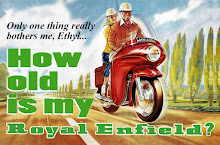The article applauds the business strategy of Siddhartha Lal, CEO of Eicher Motors, corporate parent of Royal Enfield.
He created a situation "where a slow moving, premium cruise bike is today charting double-digit growth even as other mass segment two-wheeler makers are struggling to boost sales," The Times writes.
The Economic Times is speaking of Royal Enfield's experience in India, a youthful nation on the economic upswing. Even so, the fact is that Royal Enfield is beating any logical sales expectations, even there.
Meanwhile, the local newspaper reports that the palatial Harley-Davidson store in my home town of Fort Lauderdale, Fla. is closing. Sun-Sentinel reporter Doreen Hemlock writes:
"Stung by a slow market for motorcycles, Bruce Rossmeyer's Harley-Davidson dealership is closing its Fort Lauderdale store and consolidating that operation into its Sunrise location...
"The consolidation comes as motorcycle sales in the United States only slowly recover from the 2008 recession...
"'You need cars. Motorcycles are luxury items, more aligned with yachts,' said Jeff Cheek, general manager of Bruce Rossmeyer's Harley-Davidson dealerships in Broward County."
Yachts?
 |
| Soon-to-close Harley dealership is a temple of brand loyalty. |
And this was not unique. Until the downturn, a Harley rider cruising across the United States could stop at dealerships just like it in almost every city in America. Times were good!
Most Harley-Davidson motorcycles look vintage even if their specifications are modern. Few of the motorcycles in the Fort Lauderdale dealership I visited Wednesday would not have looked familiar to me as a boy, growing up in 1955.
These motorcycles catered to a U.S. Baby Boom population of well-off wannabe riders (my People!) who wanted one last fling before retiring to the rocking chair.
It was our last chance to be bad boys and we wanted the motorcycles that we'd wanted (but couldn't have) when we were young.
My boom generation is now succumbing to bad backs, bad knees, bad wrists, bad elbows and bad bank balances. The vintage looking motorcycles that reminded us of our youth aren't selling like they used to.
What does this mean for Royal Enfield? The U.S. market probably has only modest bearing on the decision making of a company that does the vast part of its business inside India.
But trends here could suggest that Royal Enfield motorcycles of the future should not always be designed to remind someone my age of his past.
























No comments:
Post a Comment